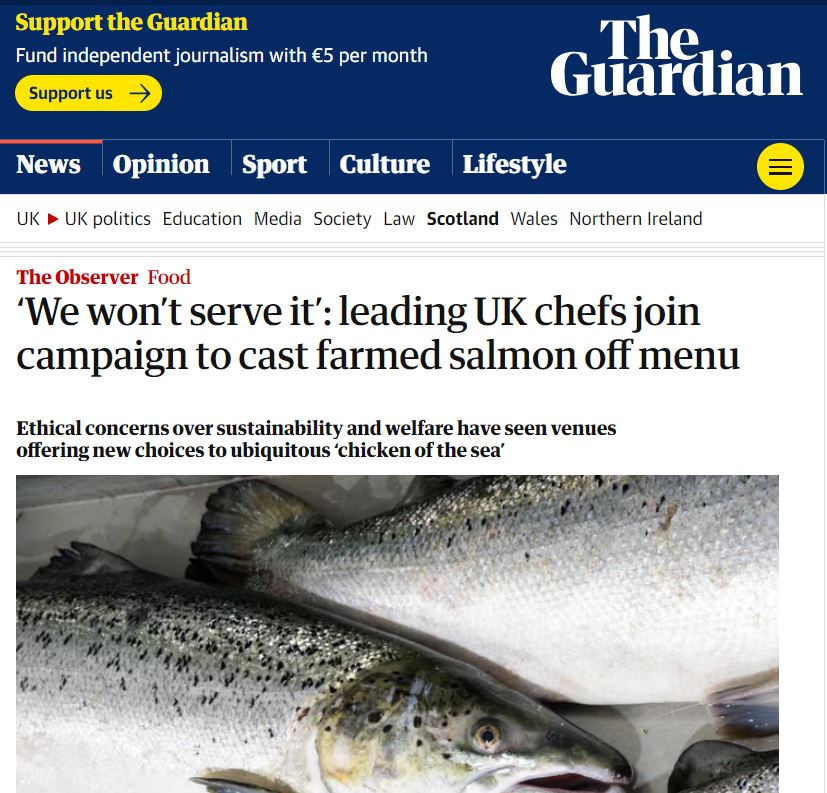 Það er skriðþungi í baráttunni fyrir vernd villtra laxastofna víðar en á Íslandi. Fjöldi matreiðslumeistarar á Bretlands hefur heitið því að taka eldislax úr sjókvíum af matseðlinum.
Það er skriðþungi í baráttunni fyrir vernd villtra laxastofna víðar en á Íslandi. Fjöldi matreiðslumeistarar á Bretlands hefur heitið því að taka eldislax úr sjókvíum af matseðlinum.
Þessi matvara er ekki í boði!
Í umfjöllun The Guardian kemur meðal annars fram:
[A]n increasing number of top chefs are turning their back on the pink-fleshed crowdpleaser – called the “chicken of the sea” by some – citing environmental and welfare issues in salmon farming, including concerns over the use of antibiotics and chemicals; the large amounts of wild fish that could otherwise be eaten by humans being used as feed; its role in declining wild salmon populations; and lack of quality.
From Devon to Scotland, restaurants, cafes, galleries and hotels have ditched farmed salmon. They include Grace & Savour, a Michelin-starred venue in Solihull in the West Midlands, zero-waste restaurant Silo in east London, the renowned “nose-to-tail” St John restaurant group, the Tate galleries and the Poco Tapas bar in Bristol, run by Guardian columnist Tom Hunt.
“I think it’s such a poor product, and because of the effect that it has on wild salmon, I won’t serve it,” says Lloyd Morse, head chef at the Palmerston restaurant in Edinburgh.
Britain’s wild Atlantic salmon population has dropped drastically since the 1970s, says Matt Palmer of WildFish, a charity encouraging restaurants to join its “Off the table” campaign, which has more than 150 restaurants on board. “Industrial salmon farming is one of the causes linked to this decline.”
…
At the Lost Kitchen in Tiverton, Devon, salmon was a longstanding menu stalwart. The 80-seat restaurant focuses on wood-fired cookery and hot-smoked its own salmon, which was a favourite among customers. “Salmon is a large, fleshy fish that cooks really well,” says manager and co-founder George Aykroyd. “It can be really delicate. A high heat means you seal the outside quicker and keep moisture inside to get a steamed, soft centre.”
But in March, the restaurant ditched one of its most popular offerings. “We decided there’s so much information out there and we have a responsibility as a business,” says Aykroyd. “It’s not about the salmon, but the production of it. Salmon in large nets in small quantities in the sea is a good thing, but now it seems it’s small nets and large quantities of salmon.”
Cornish farmed trout has been an almost seamless swap, even if around a third of customers initially asked why salmon was removed. Trout is now a bestseller and not one guest has grumbled after trying it. “We felt it was more sensible to use a very small fish farm in Cornwall who do trout in freshwater,” says Aykroyd. “We’ve visited and seen it.”
…
Chantelle Nicholson, chef-owner of the sustainable central London restaurant Apricity, used to serve salmon regularly at her previous venue, Tredwells. “It’s popular. If you put it on the menu, it sells,” she says. But the reported use of antibiotics inspired her to remove the fish.
“There’s some really good alternatives now. Chalk stream trout is similar but has a much better flavour and a lovely buttery texture,” says Nicholson, who opts mainly for line-caught mackerel and mussels for her seafood offering.
